Search the Special Collections and Archives Portal
Search Results
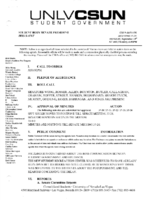
Meeting minutes for Consolidated Student Senate, University of Nevada, Las Vegas, September 10, 2007
Date
Archival Collection
Description
Text
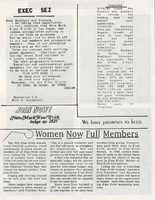
Nate Mack B'nai B'rith lodge no. 2825 Newsbeat newsletters, item 02
Description
Newsbeat newsletter (first page missing)
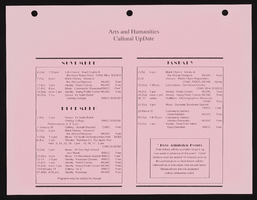
Alpha Kappa Alpha Sorority, Theta Theta Omega Chapter arts and humanities committee reports
Date
Archival Collection
Description
From the Alpha Kappa Alpha Sorority, Incorporated, Theta Theta Omega Chapter Records (MS-01014) -- Chapter records file.
Text
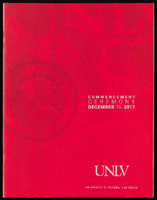
University of Nevada, Las Vegas (UNLV) Fall 2017 commencement program
Date
Archival Collection
Description
Commencement program from University of Nevada, Las Vegas Commencement Programs and Graduation Lists (UA-00115).
Text
Martha C. Knack and Omer C. Stewart Research Papers on the Pyramid Lake Paiute Tribe
Identifier
Abstract
The Martha C. Knack and Omer C. Stewart Research Papers on the Pyramid Lake Paiute Tribe contains materials collected by Stewart and Knack as research for their 1984 book,
Archival Collection
Mark L. Fine Papers
Identifier
Abstract
The collection dates from 1920 to 2019 and is primarily comprised of business and organizational records, press, photographs, scrapbooks, audiovisual materials, awards, and ephemera documenting Mark L. Fine’s career as a real estate developer in Southern Nevada and his work with various government and community organizations. The bulk of the material dates from 1980 to 2005.
Archival Collection
Lisa Levine (University of Nevada Regent) oral history interview conducted by Magdalena Martinez: transcript
Date
Archival Collection
Description
From the Lincy Institute "Perspectives from the COVID-19 Pandemic" Oral History Project (MS-01178) -- Elected official interviews file.
Text
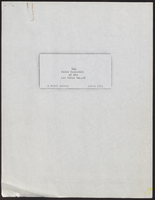
The water resources of the Las Vegas Valley: a brief survey, March 27, 1931
Date
Archival Collection
Description
Overview of the water resources in the Las Vegas Valley, includes maps
Text

Interview with Lawrence E. Lermusiaux, July 14, 2005
Date
Archival Collection
Description
Text

Interview with Peter Ediger, June 24, 2005
Date
Archival Collection
Description
Text
